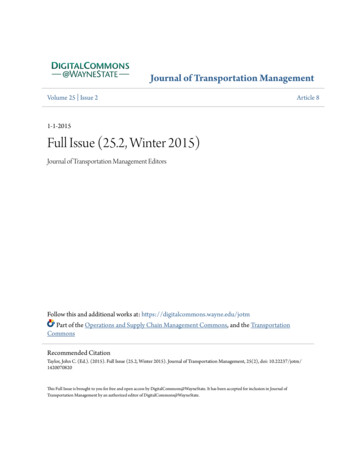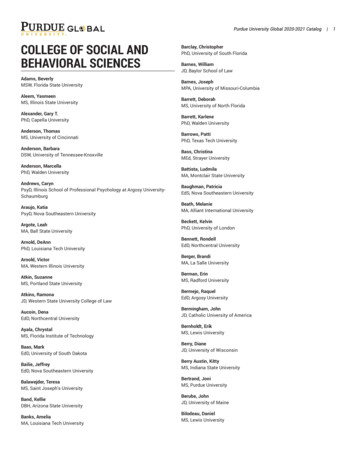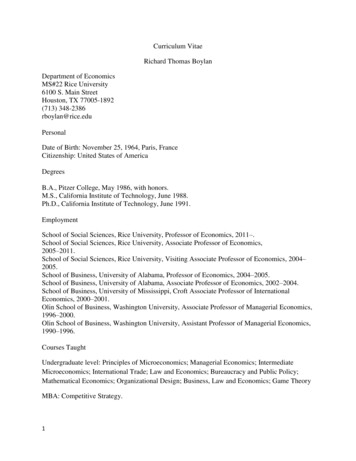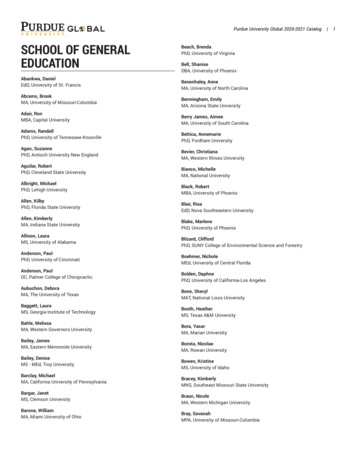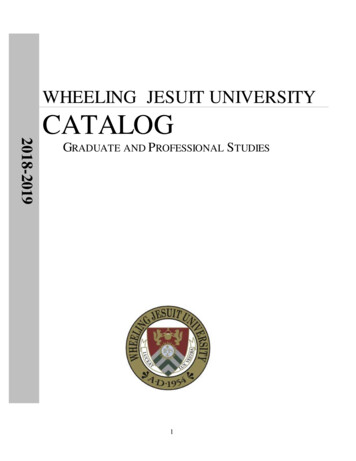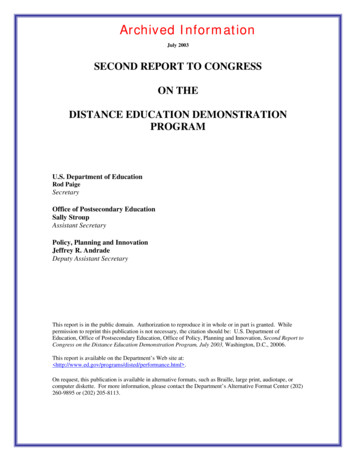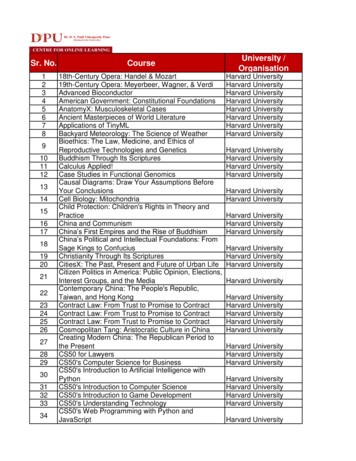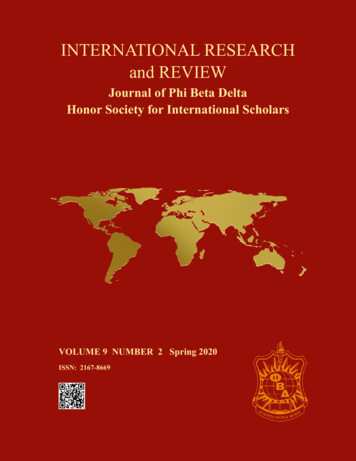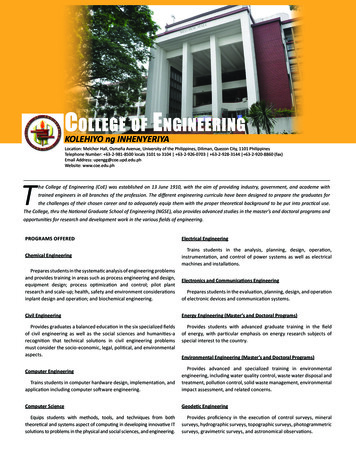
Transcription
College of Engineering 231College of EngineeringKOLEHIYO ng INHENYERIYALocation: Melchor Hall, Osmeña Avenue, University of the Philippines, Diliman, Quezon City, 1101 PhilippinesTelephone Number: 63-2-981-8500 locals 3101 to 3104 63-2-926-0703 63-2-928-3144 63-2-920-8860 (fax)Email Address: upengg@coe.upd.edu.phWebsite: www.coe.edu.phThe College of Engineering (CoE) was established on 13 June 1910, with the aim of providing industry, government, and academe withtrained engineers in all branches of the profession. The different engineering curricula have been designed to prepare the graduates forthe challenges of their chosen career and to adequately equip them with the proper theoretical background to be put into practical use.The College, thru the National Graduate School of Engineering (NGSE), also provides advanced studies in the master’s and doctoral programs andopportunities for research and development work in the various fields of engineering.PROGRAMS OFFEREDElectrical EngineeringChemical EngineeringTrains students in the analysis, planning, design, operation,instrumentation, and control of power systems as well as electricalmachines and installations.Prepares students in the systematic analysis of engineering problemsand provides training in areas such as process engineering and design,equipment design; process optimization and control; pilot plantresearch and scale-up; health, safety and environment considerationsinplant design and operation; and biochemical engineering.Electronics and Communications EngineeringPrepares students in the evaluation, planning, design, and operationof electronic devices and communication systems.Civil EngineeringEnergy Engineering (Master’s and Doctoral Programs)Provides graduates a balanced education in the six specialized fieldsof civil engineering as well as the social sciences and humanities-arecognition that technical solutions in civil engineering problemsmust consider the socio-economic, legal, political, and environmentalaspects.Provides students with advanced graduate training in the fieldof energy, with particular emphasis on energy research subjects ofspecial interest to the country.Environmental Engineering (Master’s and Doctoral Programs)Trains students in computer hardware design, implementation, andapplication including computer software engineering.Provides advanced and specialized training in environmentalengineering, including water quality control, waste water disposal andtreatment, pollution control, solid waste management, environmentalimpact assessment, and related concerns.Computer ScienceGeodetic EngineeringEquips students with methods, tools, and techniques from boththeoretical and systems aspect of computing in developing innovative ITsolutions to problems in the physical and social sciences, and engineering.Provides proficiency in the execution of control surveys, mineralsurveys, hydrographic surveys, topographic surveys, photogrammetricsurveys, gravimetric surveys, and astronomical observations.Computer Engineering
232College of EngineeringIndustrial EngineeringGRADUATE PROGRAMTrains students in designing, improving, installing, and sustainingintegrated systems of people, materials, equipment, energy andinformation, and instills the discipline to create systems that areefficient, effective, and robust.Engineering graduate programs offer advanced specialized trainingin the various fields of engineering and aim primarily to provideopportunities for advancement in the field of engineering. They aredesigned to prepare engineers for effective participation and leadershipin the country’s industrialization. Advanced materials are presented inthe form of course work and research to develop the student’s betterunderstanding of, and greater skill in, solving new and old engineeringproblemsMaterials EngineeringProvides specialized training in the characterization, processing,and applications of engineering materials in support of the manpowerrequirements of the growing engineering materials industry.Mechanical EngineeringProvides well-rounded education in the fields of thermal engineering,conventional and renewable energy, power generation, refrigeration,air conditioning, ventilation, machine design, control systems andautomation, manufacturing, vehicle engineering, and multidisciplinaryfields involving Mechanical Engineering.Metallurgical EngineeringPrepares graduates for employment in mines, mineral processingplants, smelters, steel mills, metal fabrication plants, and other factorieswhere metals and materials are being used or processed.DIPLOMA PROGRAMSSpecializations in the diploma programs are available in industrialengineering and remote sensing.MASTER’S PROGRAMSThe MS programs offered by the College are in: Chemical Engineering,Civil Engineering, Computer Science, Electrical Engineering, EnergyEngineering, Environmental Engineering, Industrial Engineering,Materials Science and Engineering, Mechanical Engineering,Metallurgical Engineering, Geomatics Engineering, and WaterResources. The College also offers the Master of Engineering in ElectricalEngineering (MEEE) and Industrial Engineering (MEngIE).DOCTORAL PROGRAMSMining EngineeringTrains students on the principles of mineral exploration and surfaceand underground mining operations with emphasis on recovering moreminerals from low-grade, marginal deposits through the applicationof mechanization, technology, scientific management, and massproduction techniques.UNDERGRADUATE PROGRAMUndergraduate programs give a solid foundation of the basicsciences of mathematics, chemistry, and physics and will enable futureengineers to understand the general methods of solving problems intheir respective fields.The undergraduate programs offered by the College are:1) Bachelor of Science in Chemical Engineering (BSChE)2) Bachelor of Science in Civil Engineering (BSCE)3) Bachelor of Science in Computer Engineering (BSCoE)4) Bachelor of Science in Computer Science (BSCS)5) Bachelor of Science in Electrical Engineering (BSEE)6) Bachelor of Science in Electronics and Communications Engineering (BSECE)7) Bachelor of Science in Geodetic Engineering (BSGE)8) Bachelor of Science in Industrial Engineering (BSIE)9) Bachelor of Science in Materials Engineering (BSMatE)10) Bachelor of Science in Mechanical Engineering (BSME)11) Bachelor of Science in Metallurgical Engineering (BSMetE)12) Bachelor of Science in Mining Engineering (BSEM)All are five-year programs except for the four-year BSCS program.PhD programs are available in chemical engineering, civil engineering,computer science, electrical and electronics engineering, energyengineering, environmental engineering and materials science andengineering. The Doctor of Engineering degree is also available in thefields of Chemical Engineering and Electrical and Electronics Engineering.ADMISSION POLICIES/REQUIREMENTSUNDERGRADUATETransfer, Shifting and Admission Policies1) Transfer, shifting, and admission for a second bachelor’s degreewill be allowed in both the first and second semesters, subject toavailability of slots.2) Transfer applicants from other institutions must satisfy the Universityrequirements for admission (see section on Academic Information).3) Applicants for transfer or shifting to any engineering program:a) must have earned at least thirty-three (33) academic units intheir respective schools/units;b) must not have completed their third year in their currentprogram; andc) must have no grade lower than 3.00 in mathematics, physics,and chemistry courses.Final admission is subject to availability of slots.4) Students of the College wishing to shift within the College andapplicants with a first degree from UP may file their applicationsdirectly with the appropriate Department Chairman through theCollege Secretary. Priority will be given to those coming from the
College of Engineering 233College. Processing of these applications will be done one weekbefore the start of the registration period.A student who is thus admitted into the College must pass all hisdeficiencies in the mathematics, physics, and chemistry courses within threeacademic years of actual residence in the University. Otherwise, he will bedropped from the rolls of the College without appeal for reconsideration.Scholastic Delinquency (College Academic Rules)A student who, at the beginning of the first semester of the schoolyear, has thirty-six (36) academic units or more to pass before graduationand who enrolls in two semesters or two semesters and summer in oneschool year must pass at least twenty-four (24) units in that school year;otherwise, he/she shall be dismissed from the College.A student who, at the beginning of the first semester of the schoolyear, has 36 academic units or more to pass before graduation andcompletes only one semester or one semester and one summer in oneschool year must pass at least 50% of all the units he/she has enrolled infor that school year; otherwise, he shall be dismissed from the College.A student who, at the beginning of the first semester of the schoolyear, has thirty-five (35) academic units or fewer to pass beforegraduation will be subject only to the University rules and regulationson dismissal.Grades of Inc. must be completed and grades of 4.00 removed beforethe registration for the semester following one academic year in orderto be credited.For purposes of definition, an academic/school year will consist oftwo semesters and one summer session.In addition to the above rules, a student must also satisfy Universityrequirements on waiver, dropping, leave of absence, academic load,graduation with honors, substitution of courses, cross-registration, etc.as specified in the pertinent portions of this catalogue.MASTER’S PROGRAMSStudents whose academic records and/or experience indicatesadequate preparation for graduate work in the field of their choicemay, upon application, be admitted as degree students. Others maybe admitted as non-degree students, in which case, they shall notbe allowed to enroll for more than one semester except by specialpermission of the Dean. Non-degree students who are able todemonstrate creditable performance in graduate courses may applyfor transfer to degree status subject to the approval of the head of thedepartment/institute concerned.Minimum RequirementsUpon completion of 12 units of graduate courses, all students shallbe guided by a program of study before they can enroll. No subject inthe program of study for which a student has already received a gradeshall be replaced by another subject without the approval of the Dean.A student shall be disqualified from any graduate program if he failsto meet the minimum weighted grade average corresponding to thenumber of units indicated below:No. of UnitsMinimum Grade Average122.3513 to 182.1519 and above2.05A weighted average of 2.00 or better for all graduate coursespassed and accepted for credit towards the degree shall be requiredfor graduation. In case a student fails to meet the required weightedaverage of 2.00, he may be allowed to take additional courses toimprove his average, subject to the approval of his adviser. No coursepreviously passed shall be repeated for this purpose.Any student who obtains a grade lower than 3.00 in six (6) or moreunits of graduate courses shall be dismissed from the program.GRADUATE PROGRAMAny holder of a bachelor’s degree in engineering or allied fields froma duly accredited institution may, upon application, be admitted to anygraduate program.Unless otherwise specified, the rules and regulations of the Universitygoverning graduate programs apply to the master’s and doctoralprograms.DOCTORAL PROGRAMSThe basic admission requirements for the doctoral program are abachelor’s degree in engineering or allied fields and a very high degreeof intellectual capacity and aptitude for advanced study and research.Minimum RequirementsTo qualify for the PhD degree, a student must:DIPLOMA PROGRAMSThe minimum unit requirements for the diploma programs follow:Dip IE18 unitsDIP RS21 units1) complete a minimum of 24 units of graduate courses if he/she has amaster’s degree, or a minimum of forty-five (45) units if he/she hasa bachelor’s degree.2) maintain a cumulative weighted average of 1.75 or better in all thecourses in his/her program of study;3) pass the PhD qualifying examination after passing the core, specialty,applied mathematics, and elective courses; and
234College of Engineering4) submit a doctoral dissertation based on an independent and originalresearch in the chosen field and successfully defend it in a FinalDoctoral Examination.PRIVATE SCHOLARSHIPThe College of Engineering continuously receives private scholarshipsfor students in need of financial assistance. The following are some ofthe available scholarships for Engineering students:1) Concepcion Hidalgo Sandoval Memorial Scholarship2) Flour-Metrobank Foundation College Scholarship Program3) GMA Network Inc.4) Kayan Chan Scholarship5) PASAR Foundation, Inc. (PFI)6) Pay Engg Forward Scholarship Program (Michael Gonzales Donation)7) PETRON Scholarship Grant8) PHILEX MINING Scholarship9) Philippine Australia Resources Education Excellence Program(PAREEP)10) PNOC EC11) Robert G. Cheng-Uratex Undergraduate Scholarship12) Tau Alpha Foundation, Inc. (TAFI)linked to the instruction and research activities in the various fields ofcivil engineering. The classroom, library, office space, computing andlaboratory facilities of these Centers have been supporting academic,research and extension activities of the Institute.The Department of Chemical Engineering has computing facilities andinstructional and research laboratories. Students can do experimentsin unit operations, unit processes, thermodynamics, and processcontrol. The department also has research laboratories in biochemicalengineering; fuels, energy and thermal systems; polymers and catalysis;electrochemical engineering; and environmental process engineering.Some of the major equipment of the Department are: GC-MS, GC FID,GC TCD, Ion Chromatograph, HPLC, RT-PCR, Denaturing Gradient GelElectrophoresis Analyzer, Scanning Electron Microscope, FITR, AtomicAbsorption Spectroscopy, Karl Fischer Titrator, Kjeldahl NitrogenAnalyzer, ovens, dryers, mixers, mills, screens and incubators.The Department of Computer Science houses two large lecture halls;five computer classrooms, one equipped with Apple iMac computers;and seven research laboratories equipped with Apple iMac and Mac Promachines, Acer, HP and IBM computers, smart phones, and tablets withboth android and iOS platforms, thin clients, printers, and servers. Allof these are in rooms that are fully air-conditioned with tempered glassboards and projectors.FACILITIESThe Institute of Civil Engineering maintains the ConstructionMaterials and Structures Laboratory (CoMSLab). CoMSLab supportsthe instruction, research, and extension activities of the Institute. It isthe instruction laboratory for the undergraduate class in constructionmaterials as well as for the graduate course in soil and rock testing. It alsohosts the experiments of students doing their undergraduate researchunder the construction materials and geotechnical engineering tracks.The Institute also maintains the Civil Engineering ComputationalLaboratory. Inaugurated in November 2005, this instructional laboratoyhas thirty-five (35) units of desktop personal computers that are used bycivil engineering students and faculty in courses requiring computations.The laboratory is located at Room 235 of Melchor Hall.The Institute is one of the beneficiaries of the on-going ten-year multibillion-peso program of the national government called the EngineeringResearch and Development for Technology (ERDT) through theconstruction of new classrooms, offices (Institute ffice and ClassroomWing) and laboratory facilities (Structural Engineering Laboratory andConstruction Engineering and Management Laboratory, Fire Laboratory,Water Resources Engineering Laboratory and Geotechnical EngineeringLaboratory, Environment and Energy Engineering Laboratory, andTransportation Engineering Laboratory) in the Engineering Complex.Three research and extension-service Centers were also establishedover the years that continue to involve civil engineering facultymembers and students. These are the U.P Building Research Service(UP-BRS) established in 1971; the National Hydraulic ResearchCenter (NHRC), established in 1973; and the UP National Center forTransportation Studies (UPNCTS), established as Transport TrainingCenter in 1976. Extension services of these Centers have been closelyThe Electrical and Electronics Engineering Institute (EEEI) maintainsthe following instructional laboratories where students are trainedon basic usage and handling of computers, equipment, electroniccomponents, devices, and software:1) Alexan Electronics Laboratory (A-Lab)2) Basic Electronics Laboratory (B-Lab)3) Communications Electronics and Embedded Systems Laboratory (CEESL)4) Electrical Machines Laboratory (EML)5) Electronics Laboratory (E-Lab)6) Electronics Prototyping Laboratory (EPL)7) Network Simulation and Training Laboratory (NSTL)8) Software Applications Training Center (STC)In addition, the EEE Instritute also maintains the following researchlaboratories that support research and development in various areasof Electrical and Electronics Engineering:1) Astec Power Electronics Laboratory (PEL)2) Computer Networks Laboratory (CNL)3) Digital Signal Processing Laboratory (DSP)4) Electric Power Research Laboratory (EPRL)5) Intel Microprocessors Laboratory (IML)6) Instrumentation, Robotics, and Control Laboratory (IRC)7) Microelectronics and Microprocessors Laboratory (MicroLab)8) Mobile Robotics Laboratory (Mobot)9) Power System Simulation Laboratory (PSSL)10) Robotics and Automation Laboratory (RAL)11) Solar Photovoltaics Laboratory (SPL)12) Wireless Communications Engineering Laboratory (WCEL)The Department of Geodetic Engineering and the TrainingCenter for Applied Geodesy and Photogrammetry (TCAGP) share thefollowing equipment: Theodolites: WILD (T-1, T-2); stereoplotters: Wild
College of Engineering 235Autograph A-8, Aviograph B-8, Kern PG 2 and 3, Kelsh plotter; SEG-Vrectifier-enlarger; mirror stereoscopes; WILD electronic distancemeter; Coradi Coordinatograph, Garrett process camera; photographicprocessing laboratory, ZEISS Ortophoto projector and contact printer KG30; WILD PUG 4 point transfer device and film viewer; Logetronic RAP 20film processor; spectroradiometer; SummaGraphics digitizer; Mitsubishithermal printer; Hewlett-Packard color printer; Sun workstation;personal computers; image processing software: ERMapper, Disimp,Microbrian, BSIPP; geographic information systems software: ArcInfo ,SPANS, OSUMAP, and APPL7.An Ergonomics and Methods Engineering Laboratory, equipped withaudio-visual and ergonomic instruments for instruction purposes, ismaintained by the Department of Industrial Engineering and OperationsResearch. The Department also has a computing facility equipped withpersonal computers with selected statistical, modeling, and simulationsoftware packages for use of IE students.The Department of Mechanical Engineering has several instructional,research and develpment laboratories, shops, and fabricationfacility that provide its students computational capability, handson training and exercises in using machine tools and equipment inmechanical engineering systems. These facilities enable students todo computational validation of designs, fabrication and building ofcomponents and systems, and research and development activities. Thelaboratory competencies that students learn are indispensable to theirfuture in industry, academic and research institutions, and government.The following are the facilities of the Department of MechanicalEngineering:1) Instrumentation Laboratory2) Computational Mechanics Laboratory3) EMERSON Heating, Ventilation, Air Conditioniong and RefrigerationLaboratory4) Power Laboratory5) Biomechanics Laboratory6) Machine Design Laboratory7) Computer Integrated Manufacturing Laboratory8) Manufacturing and Design Center9) Vehicle Research and Testing Laboratory10) ME Shop and Fabrication FacilityThe Department of Mining, Metallurgical and Materials Engineeringhas batch testing and pilot scale testing facilities for mineral processingand foundry testing. It also maintains metallographic, morphological,scanning and transmission electron microscopes. The Department alsohas a powder X-ray diffractometer, X-ray fluorescence spectrometer,atomic absorption spectrometer and EDS/WDS-based microanalyticalequipment.The Department also has the following instructional and researchlaboratories: Shop Laboratory, Nanomaterials Laboratory, JoeresLaboratory, Shono Semiconductor Laboratory, Electron MicroscopyLaboratory, Extractive Metallurgy Laboratory, Metallography Laboratory,Composite Materials Laboratory, Advance Alloys Laboratory, SurfaceScience Laboratory, Advance Ceramic Laboratory, ElectrometallurgyLaboratory, Substrate Processing Laboratory, Computational MaterialsLaboratory, and EM Computing Laboratory.The University of the Philippines College of Engineering Library, morecommonly known as Engg lib among the UP locals, has been the forefrontof library excellence within the UP System. The Library is housed in twolocations: EnggLib1 is currently in Melchor Hall, servicing the ChE, GE, IEOR,and ME Departments, and ICE, while EnggLib 2 is at the UP Alumni EngineersCentennial Hall servicing the CS, EEE, and MMM students and faculty. Theinterior design of the new library merges the conventional or traditionallibrary look woody and cozy, with the modern arrangement ‑minimalist,multifunctional and ergonomic.Its vast collection includes print and electronic books, journals,magazines, theses, plant designs and feasibility studies on variousfields of engineering and computer science but skews more onlineresources because of their convenience, practicability and economicalquality. As of the AY 2012-2013, the library is host to three dozens ofworld-renowned scholarly journals and e-book database accessible viapowerful workstations and eReaders. To better service these onlineresources, EnggLib offers the UP College of Engineering communityvarious facilities and technologies to utilize. One is The LearningCommons, a technologically-based social learning space in the librarywhich offers a one-stop shop for computing, reference services, andmultimedia needs. The facility caters to academic group discussions,collaborative, and shared learning. These and more top-of-the-classresources, services, and facilities can be seen at the UP College ofEngineering Library as it strives to achieve its mission of inculcating inthe Engineering community how to “Innovate. Recreate. Collaborate.”
236College of EngineeringBACHELOR OF SCIENCE IN CHEMICAL ENGINEERINGBACHELOR OF SCIENCE IN CIVIL ENGINEERINGAPPROVAL135th UPD UC: 24 June 2016 President AEPascual : 26 January 2016APPROVAL135th UPD UC: 24 June 2016 President AEPascual : 26 January 2016182 units184 unitsF I R S T1st SemesterGE (AH 2) Comm 3Chem 17Physics 71Physics 71.1ChE 100Math 53PES E C O N DY E A R1st SemesterMath 54Chem 28Chem 28.1Physics 72Physics 72.1ChE 26PENSTPMath 55Chem 31Chem 31.1Physics 73Physics 73.1ChE 101PENSTPT H I R D1st Semester3233331st SemesterF I F T H1st Semester19 unitsEEE 3GE 12CE 14CE 15CE 28CE 1313323323CE 16CE 22CE 110CE 121CE 155CE 1622nd Semester18 units233333F I F T H1st SemesterQualified Electives: ChE 153, ChE 171, ChE 174, ChE 197, ChE 198, EgyE 1011. Six (6) units of RGEP courses must be in the Philippine Studies domain2. Minimum of nine (9) units of English/Communication courses must be taken3. Except for Math 1, RGEP courses in the MST domain must NOT be under Physics,Chemistry or MathematicsAs a requirement for graduation, all students are required to take one (1) year programin one of the following components: (a) Military Training Service (ROTC); (b) Civic WelfareTraining Service (CWTS); (c) Literacy Training Service.GE (SSP 4) Free ChoiceCE 112CE 124CE 142CE 157CE 190Elective 1CE 111CE 123CE 132CE 141CE 156CE 163333333Y E A R2nd Semester19 units3333323343333Y E A R17 unitsY E A RGE (MST 3) STSGE (AH 5) Free ChoiceGE (SSP 4) Free ChoiceGE (SSP 5) Free ChoiceChE 142ChE 144Qualified Elective413333341333(2)Y E A R2nd Semester1st Semester20 units3213333Math 55Physics 72Physics 72.1GE 10ES 11CE 26PEF O U R T H2nd Semester18 units335412(2)Physics 73Physics 73.1ES 12ES 13CE 21CE 27Y E A RGE (AH 4) Free ChoiceGE (MST 2) Free ChoiceChE 135ChE 140ChE 150ChE 124ChE 126Y E A R17 units17 units33334333355(2)(3)2nd SemesterT H I R D1st Semester19 units333333GE (SSP 3) Free ChoiceChE 143ChE 190ChE 182ChE 141PI 100Qualified ElectiveGE (AH 4) Comm 3Geol 11Math 54Physics 71Physics 71.1ES 1PE2nd Semester18 unitsGE (AH 3) Fil 40GE (SSP 3) Philo 1GE (MST 2) Free ChoiceMath 53Chem 16PENSTP18 units19 unitsF O U R T H333335(2)(3)1st Semester332414(2)(3)GE (SSP 2) Kas 1ChE 123ChE 125ChE 131EEE 1ES 1219 unitsS E C O N DY E A R2nd Semester17 unitsGE (AH 3) Fil 40ChE 132ChE 133ChE 134ES 13Chem 154GE (MST 1) Free ChoiceGE (AH 1) Free ChoiceGE (SSP 1) Kas 1GE (SSP 2) Free ChoiceGE (AH 2) Eng 10Math 17PENSTP17 units532413(2)(3)ChE 122ES 1ES 11ChE 106MatE 10IE 3354115(2)2nd Semester18 units2nd Semester20 units19 units33355(2)Y E A R1st Semester2nd Semester19 unitsGE (AH 1) Eng 10GE (SSP 1) Philo 1GE (MST 1)Chem 16Math 17PEF I R S TY E A R18 units3333313GE (AH 5) Free ChoiceGE (SSP 5) Free ChoiceGE (MST 3) STSPI 100CE 199Elective 23333331. Kas 1 & Fil 40 satisfy the 6-unit Philippine Studies requirement2. Minimum of nine (9) units of English/Communication courses must be taken3. Except for Math 1, RGEP courses in the MST domain must NOT be under Physics,Chemistry or MathematicsAs a requirement for graduation, all students are required to take one (1) year program inone of the following components: (a) Military Training Service (ROTC); Civic Welfare TrainingService (CWTS); (c) Literacy Training Service.
College of Engineering 237BACHELOR OF SCIENCE IN COMPUTER SCIENCEBACHELOR OF SCIENCE IN COMPUTER ENGINEERING146 units181 unitsAPPROVAL135th UPD UC: 24 June 2016 President AEPascual : 26 January 2016APPROVAL135th UPD UC: 24 June 2016 President AEPascual : 26 January 2016F I R S TY E A R1st Semester17 units33353(2)GE (SSP 2) Free ChoiceGE (AH 2) Free ChoiceCS 30Math 53CS 12PES E C O N D35334(2)(3)GE (AH 4) Fil 40CS 135Math 55Physics 71CS 140CS 150PENSTP333333333433(2)(3)334145(2)(3)EEE 23EEE 35ES 11Math 55Math 114ES 1PENSTPGE (MST 1) STSEEE 25EEE 41EEE 42EEE 43CoE 23ES 123331333Y E A R2nd Semester16 unitsGE (SSP 5) Free ChoiceCS 196CS 199CS 200GE (MST 4) Free ChoicePI 100Free Elective3133331. Six (6) units of RGEP courses must be in the Philippine Studies domain2. Minimum of nine (9) units of English/Communication courses must be taken3. As a requirement for graduation, all students are required to take one (1) year programin one of the following components: (a) Military Training Service (ROTC); (b) Civic WelfareTraining Service (CWTS); (c) Literacy Training Service.1st Semester18 unitsGE (AH 3) Fil 40EEE 105EEE 51EEE 52EEE 100EEE 101EEE 53Y E A R16 units3332313F I F T H1st SemesterGE (SSP 3) Free ChoiceCoE 113CoE 115CoE 134CoE 15134324Y E A R2nd Semester17 unitsGE (SSP 4) Free ChoiceGE (AH 4) Free ChoicePI 100CE 22EEE 190Elective34311332nd Semester18 unitsGE (MST 2) Free ChoiceCoE 111CoE 135CoE 133EEE 107EEE 54Elective443332(2)(3)Y E A R2nd Semester19 units33333313333343Y E A R19 unitsF O U R T HCS 195 (Practicum)19 unitsEEE 21EEE 13EEE 33EEE 34Physics 72Math 54PENSTP33345(2)2nd SemesterT H I R D1st Semester3 units1st SemesterGE (AH 2) Comm 3EEE 11EEE 31Physics 71Math 53PE20 unitsS U M M E RF O U R T H33355(2)1st Semester19 unitsGE (SSP 3) Kas 1CS 131CS ElectiveCS 180CS 192CS 153CS 19418 unitsS E C O N DY E A R2nd Semester18 unitsGE (SSP 4) Free ChoiceGE (MST 2) STSGE (MST 3) Free ChoiceCS 198Physics 72Math, Science or EnggElectiveGE (AH 1) ENG 10GE (SSP 1) Philo 1GE (SSP 2) Kas 1Chem 16Math 17PE19 unitsT H I R D1st SemesterGE (AH 5) Comm 3CS 130Stat 130CS 145CS 165CS 19133353(2)2nd Semester18 units2nd Semester19 unitsY E A R1st SemesterY E A R1st Semester17 unitsGE (AH 1) Comm in EnglishGE (SSP 1) Philo 1GE (MST 1) Free ChoiceMath 17CS 11PEGE (AH 3) Eng 10Math 54CS 32CS 133CS 21PENSTPF I R S T2nd Semester17 units333323GE (SSP 5) Free ChoiceGE (AH 5) Free ChoiceGE (MST 3) Free ChoiceCoE 198Elective333531. Kas 1 & Fil 40 satisfy the 6-unit Philippine Studies requirement2. Minimum of nine (9) units of English/Communication courses must be taken3. Except for Math 1, RGEP courses in the MST domain must NOT be under Physics,Chemistry or Mathematics4. As a requirement for graduation, all students are required to take one (1) year program inone of the following components: (a) Military Training Service (ROTC); Civic Welfare TrainingService (CWTS); (c) Literacy Training Service.
238College of EngineeringBACHELOR OF SCIENCE IN ELECTRICAL ENGINEERINGBACHELOR OF SCIENCE IN ELECTRONICS AND COMMUNICATIONS ENGINEERING184 units183 unitsAPPROVAL135th UPD UC: 24 June 2016 President AEPascual : 26 January 2016APPROVAL135th UPD UC: 24 June 2016 President AEPascual : 26 January 2016F I R S TY E A R1st Semester2nd Semester19 unitsGE (AH 1) Eng 10GE (SSP 1) Philo 1GE (SSP 2) Kas 1Chem 16Math 17PEGE (AH 2) Comm 3EEE 11EEE 31Physics 71Math 53PES E C O N DEEE 23EEE 35ES 11Math 55Math 114ES 1PENSTPT H I R D1st Semester3333133F I F T H1st SemesterEE 121EE 153EEE 51EEE 52EEE 105ME 63EEE 21EEE 25EEE 41EEE 42EEE 43EEE 44ES 12333143GE (AH 5) Free ChoiceGE (SSP 5) Free ChoiceGE (MST 3) Free ChoiceEE 198PI 100EEE 23EEE 35ES 11Math 55Physics 73PENSTPECE 141EEE 53EEE 54EEE 100EEE 105EEE 101Elective3313323Y E A RGE (SSP 3) Free ChoiceECE 113CoE 115ECE 117ECE 151EEE 103333333Y E A R2nd Semester20 units1. Kas 1 & Fil 40 satisfy the 6-unit Philippin
Environmental Engineering (Master's and Doctoral Programs) Provides advanced and specialized training in environmental engineering, including water quality control, waste water disposal and . Materials Science and Engineering, Mechanical Engineering, Metallurgical Engineering, Geomatics Engineering, and Water Resources. The College also .

